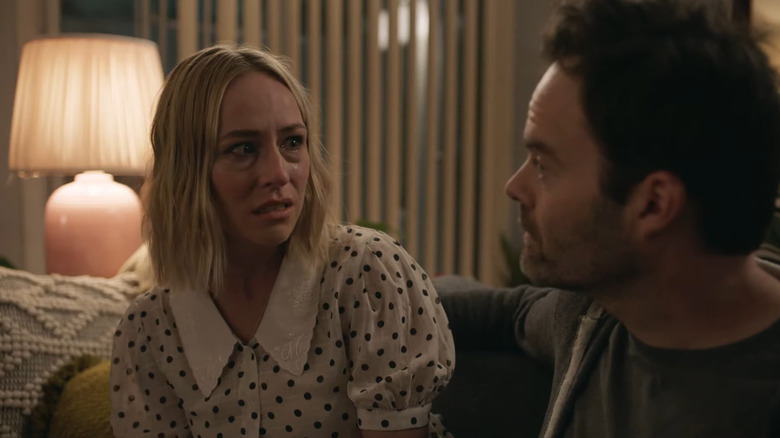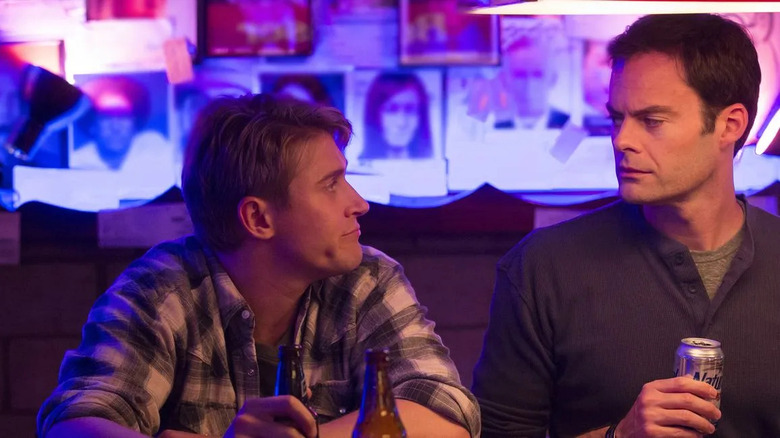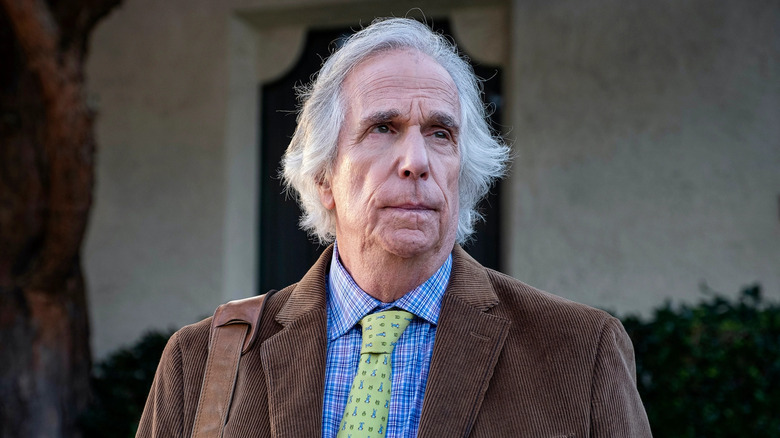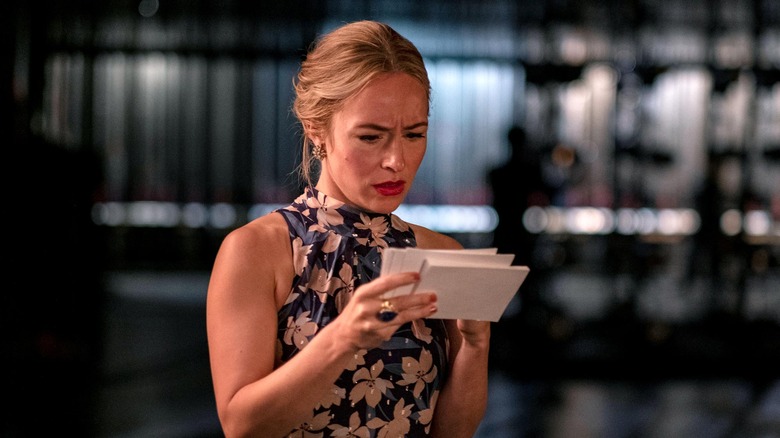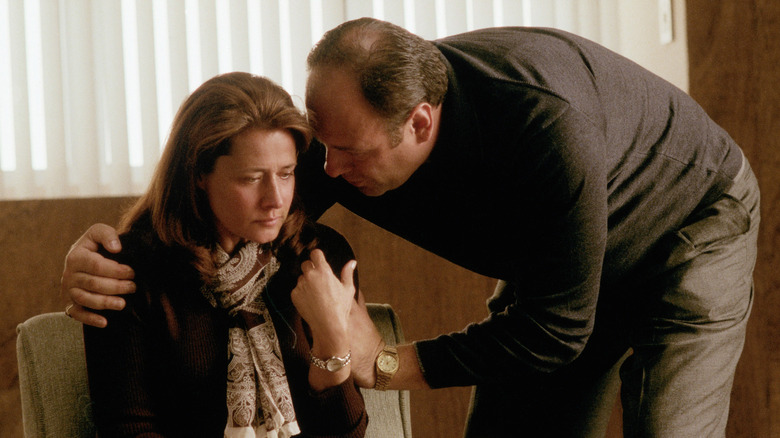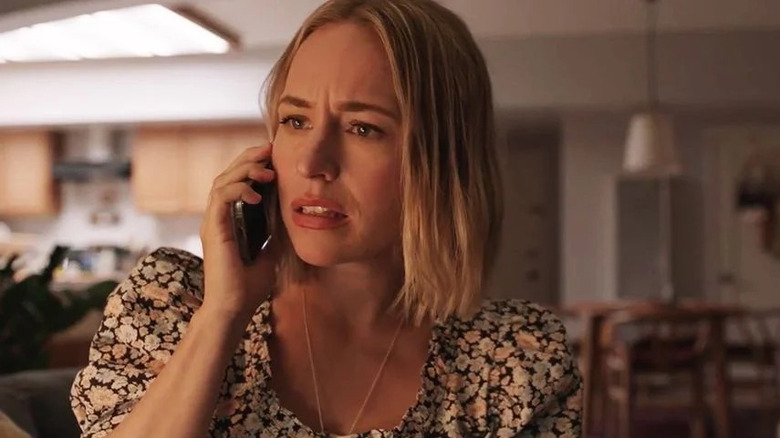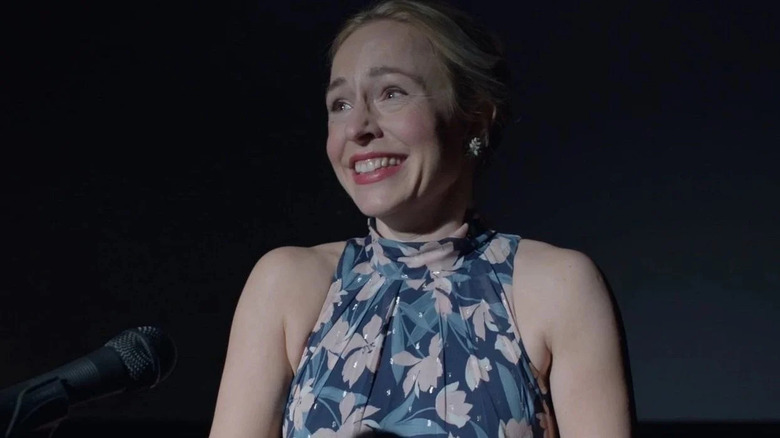On Season 3 Of Barry, How Long Until Sally Finds Out?
This post contains spoilers for "Barry" season 3, as well as "Breaking Bad," "Mad Men," and "The Sopranos."
A number of game-changing events happened in the latest episode of "Barry." After the motorcycle chase and the reveal with Chris's wife Sharon, it might be easy to forget that, not long before, Barry (Bill Hader) did the most psychotic, unforgivable act in the whole show so far: he sent a text to Sally by using the voice-to-text feature on his phone, loudly, in a public place, with zero concern for how he's coming across to the strangers in the store around him.
The show then cuts to a perplexed Sally (Sarah Goldberg) reading his rambling text aloud to her agent, which includes the part where one of the store employees told Barry to keep his voice down. (Barry does not proofread his voice-texts before sending them.) "You dodged a bullet," her agent tells her, and neither of them fully understand just how correct she is. Not only is Barry an increasingly unhinged murderer, but if he'd still been living with Sally, she easily could've been caught in the crossfire of this episode's events.
Although Sally still doesn't fully understand how dangerous Barry is, the second half of season 3 has her more aware than ever of his many red flags. The previous episode ("Crazytimesh*tshow") had Barry attempt to open up to Sally by calmly offering to psychologically torture her boss. There's a split second moment where it seems like Sally might actually be into it, but the show smartly decides to have her react in a more realistic manner. "I need you to get away from me," she says.
It's yet another low in Barry and Sally's relationship, one that raises a big question for the show going forward: is Sally going to figure out Barry's a killer? And what's she going to do when she does?
Only a matter of time
All of Barry's past misdeeds have been coming back to haunt him this season, thanks to Fuches (Stephen Root). Assuming Barry survives his recent encounter with Sharon (it's hard to imagine season 4 playing out with Barry dead), he'll still have to deal with his old army buddy Albert (James Hiroyuki Liao) as well as Janice Moss's father (Robert Wisdom).
And yet, the murder that suspiciously hasn't gotten much focus yet is the murder of Ryan (Tyler Jacob Moore) back in the pilot episode. Fuches approached Ryan's father with information about Barry, but the character hasn't shown up since. Although Barry didn't technically do the deed himself, the only reason he ever met Sally or Gene Cousineau (Henry Winkler) is because he was hired to murder Ryan. The police found a grainy video of Barry at the scene of the crime but no one in the acting group recognized it as him, because nobody knew Barry yet.
"If this guy was someone you knew," Janice said about the blurry image in the beginning of season 1, "you'd recognize him." It was only after Janice spent a dinner with Barry and looked at the photo again that she figured it out for certain. For Sally to start suspecting Barry of murder, all anyone has to do is get her to look at that image again, now that she's spent years with the man. Even ignoring the photo, all one would have to do at this point is remind her that Ryan died right after Barry joined her acting class, and that Barry was at Cousineau's house with her the night Janice disappeared. If Ryan's dad decides to contact Sally, that should be all the push she needs.
A familar plot point
With most shows centering around a male anti-hero, a major driving source of tension in the early seasons is whether or not the character's wife/love interest will find out about his double life and how she'll respond when she does. "Breaking Bad" leaned far more heavily into this plot, as Skyler (Anna Gunn) was deeply suspicious of Walt's methcapades from the moment they began. The early seasons of "Mad Men" had Don (Jon Hamm) hiding major aspects of his life from Betty (January Jones), with Betty finding out about his infidelity in the season 1 finale and about his stolen identity in season 3.
Most shows like this follow through on the storyline. Skyler doesn't simply turn Walt in, but slowly compromises herself to the point where she's his partner-in-crime by season 4. Betty divorces Don, but continues to be a prominent character on the show whose relationship with Don evolves a lot over the subsequent four seasons.
Whenever or however Sally finds out about Barry's secret, it's likely the show won't take the easy way out by having Barry kill her off quickly afterward. The show's already dedicated two and a half seasons to exploring her as a character, giving Sally her own storylines where Barry's barely a factor. To end the storyline with Barry feeling forced to kill her to protect himself would be lazy and predictable, and so far season 3 of "Barry" has been anything but.
Parallels between Cousineau and Sally
Just as Cousineau's discovery of Barry's crimes didn't stop Cousineau's overall character arc of trying to make up for his past mistakes, Sally's discovery likely won't put a stop to her journey of being an up-and-coming actress. Instead, it'll complicate things. Cousineau's quest for redemption — shown most clearly in this latest episode where he offers a woman he previously blackballed out of Hollywood the chance to direct her own TV show — is complicated by how all this forgiveness he's earning is the result of him choosing to let a murderer get away scot-free. He might be making amends, but it's all because of him letting Barry off the hook, which is arguably the worst thing he's ever done.
Sally's character arc on the show so far centers around her trying to be an honest artist, someone who climbs the ladder without selling out. These aspirations hit their first real stumble in the season 2 finale, where she backed out of her truthful performance of what her abusive relationship with her ex-husband Sam was like, which results in her receiving a ton of acclaim from the talent agents watching. Season 3 finds Sally as the writer and star of her own show, but her success here is built on a lie. Not as big as Cousineau's lie, but a lie nonetheless. The latest episode features yet another compromise from Sally, as she agrees to be a writer on a show she clearly doesn't respect, because there's no acting projects currently available for her. Although I like Sally more than many Barry viewers, I don't think she's above compromising her morals if it means the advancement of her career.
Sally's tunnel vision
It's hard to imagine Sally ever being an accomplice to Barry's crimes, but then again, it was also hard to imagine season 2 Skyler helping Walt out like she did throughout season 4. When Skyler found out in "Breaking Bad," she first attempted to break away from Walt, but Walt had trapped her in their marriage and she slowly came around to his side. When her brother-in-law gets shot, Skyler realizes she can do some good by using Walt's meth money to help pay for Hank's medical bills, and it's all downhill for Skyler from there.
Perhaps the more likely scenario for Sally is that she treats Barry's assassin career in much the same way Tony's family thinks of it in "The Sopranos." Carmela, Meadow, and AJ are all aware that their father is a mob boss, but none of them ever seem interested in exploring what Tony's job actually means. In season 6, Meadow and Carmela tell Tony a secret regarding a man in his crew's sexuality, neither of them seeming to fully understand that they're signing the man's death warrant. Because Tony's life of violence benefits them, Tony's family members are content to not think about it most of the time.
On the same note, it's not too difficult to picture Sally overlooking Barry's terrifying flaws if it's convenient for her. "She has this complete tunnel vision," Sarah Goldberg said about her character, describing Sally's thought process as, "'If I can just be a famous actress, I'm going to be okay" Her fatal flaw is that her career ambitions lead her to be thoughtlessly cruel to those around her (see: poor Natalie), and Barry will almost certainly try to take advantage of that.
Maybe she'll reject Barry completely
When Barry offers to break into Sally's boss's house and psychologically torture her, Sally almost immediately pushes him away. Even though she's furious at the woman, she turns down the chance for extreme retribution. With that in mind, maybe Sally is less similar to Tony's family and more like Dr. Melfi (Lorraine Bracco), who sets herself apart in "The Sopranos" by being the only person to refuse to get dragged into Tony's world.
Melfi's big, defining moment on "The Sopranos" came in the season 3 episode "Employee of the Month," where she's attacked and raped in the parking garage of her office building. The police are useless in bringing the rapist to justice, so Melfi is tempted to tell Tony about what happened. She knows if she tells Tony about the situation, he won't hesitate to hunt down and murder the guy. It was a potential crossroads moment for the show; if she had told Tony about what happened, Melfi and Tony's relationship likely would've gone in a darker direction than it did, with Melfi being morally compromised and Tony having something to hang over her head. Instead, she chooses not to say anything, and ends up serving as the show's voice of wisdom. When the show's only clear-cut "good" character rejects mafia violence, that serves as the show's clearest condemnation of who Tony is and what he does.
Based on Sally's moments in season 3 so far, it's easy to see her going in a similar direction: maybe she differentiates herself from Cousineau by being the first person Barry's close to who clearly, definitively condemns his actions. But if Sarah Goldberg's recent statements about her character is any indication, this likely won't be the case.
Sally's monster
"I am not going to be the moral barometer for this show," Goldberg told Variety in an interview regarding season 3. "I'm so used to that happening to women on television, where there's no desire to see unlikable women on TV, so the characters get pushed to be more and more likable." And she's certainly got a point: so many anti-hero TV shows have, often in response to the fanbase idolizing the main character too much, decided to place the major female characters into a position of moral superiority. This could be especially seen in the final season of "The Sopranos" where Melfi decides Tony's a sociopath and kicks him out of her life for good. The purpose seemed to be to make it as clear as possible that Tony's a bad guy and that Melfi is in the right, but it felt rushed and overly simplistic. Lorraine Bracco herself was unsatisfied with her character's departure.
Behind the scenes, Goldberg seems adamant that Sally doesn't receive the same treatment: "I made it very clear, she is as morally bankrupt as the rest of them. It just manifests in a completely different way. And these are all characters who are making very selfish decisions. They could all easily be better versions of themselves, but they're choosing that instant gratification instead."
Goldberg gives viewers a heads up that some of Sally's most "unlikable" moments as a character are coming up in the final episodes of the season: "If she's unlikable, let's make her a monster. And that was my goal for Season 3. So Episodes 7 and 8, you will see some of Sally's monster, I can tell you that much."
Embracing organic character development
More so than most shows of its kind, "Barry" is very willing to let its characters be unlikable. Everyone here is deluded to a certain extent, everyone's constantly doing things we don't approve of. When it comes to Sally in particular, the show's never bothered with giving her the sort of moral high ground that Melfi got in "The Sopranos," even if Sally is objectively not as bad as the murderers that make up most of the show.
It's a refreshing change of pace in a TV landscape where writers feel the need to repeatedly underline that their anti-hero main character is not someone to be emulated, often by having a major female character be, as Goldberg put it, the show's moral barometer. After Skyler on "Breaking Bad" was received with an absurd level of misogyny-fueled backlash, the anti-hero TV shows that followed seemed to be writing from a defensive position, trying to pre-emptively address the sort of arguments aimed at characters like Skyler or Betty or Carmela.
"Barry" takes a different approach; instead of trying to respond to the type of viewers who get disproportionately enraged by flawed female characters, the show ignores them entirely. It's reassuring to know that no matter which way the show decides to handle Sally's inevitable realization that Barry's a hitman, the vocal section of the fanbase that can't stand Sally doesn't seem to be a factor in their decision. "Barry" seems content to allow Sally to make decisions most organic to her character, regardless of how unlikable it makes her. It's this choice that's allowed "Barry" to be one of the most surprising and compelling shows on TV right now, and what's kept it going strong for three seasons straight.
